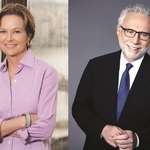Obermayer Awards 2021

- Date/Time
- –
- Format
- Online
The following text is taken from the Obermayer Awards website:
Berlin, Germany —January 13, 2021 — Germans who have raised awareness of once-vibrant Jewish communities and used the lessons of the Nazi era to fight prejudice and counter the far right will receive 2021 Obermayer Awards. The awards will be presented on January 25, 2021 at the Abgeordnetenhaus, the home of the Berlin Parliament. The ceremony is the Parliament’s main formal commemoration of International Holocaust Remembrance Day.
The ceremony will be broadcast live over the internet on the web sites of the Abgeordnetenhaus and Widen the Circle at 18:00 CET/12:00 EST on January 25th. It will be rebroadcast (English only) at 8:00 PM EST.
“Obermayer awardees exemplify how acknowledging a country’s dark past can become a motivation to improve the present and future,” said Joel Obermayer, executive director of Widen the Circle, which administers the awards.
Now in their 21st year, the awards honor German individuals and groups that have illuminated the vital role Jews played in German society for hundreds of years before the Nazis tried to exterminate them. The awards also honor those who fight against modern-day prejudice and racism (including anti-Semitism) through innovative efforts, and who foster the kind of understanding among different groups that prevents prejudice from taking root. The 2021 Obermayer Award winners are:
- AKuBiZ, Pirna: This all-volunteer organization finds creative ways to counter neo-Nazis and the far right in the Saxon Switzerland area, despite threats of violence and attacks on its leaders. Its activities include historic hiking tours, notably to sites of anti-Nazi resistance, and a digital atlas that depicts the local history of the Nazis. AKuBiZ (full name: Alternative Culture and Education Center Saxon Switzerland) also published an innovative comic book that deals with right wing violence, and the organization has a range of activities designed to counter anti-immigrant and anti-LGBTQ sentiments. In addition, it created a traveling exhibition that provides an overview of diverse Jewish life before the Holocaust.
- Erich-Zeigner-Haus (EZH), Leipzig: EZH empowers high school students in Leipzig and throughout Saxony to confront the Nazis’ legacy as well as to stand up against the activities of current right-wing extremists. The organization inspires and helps students to engage in independent research on local Holocaust victims and then raise money in their communities to establish memorial stumbling stones (stolpersteine) as well as plaques for the “Silent Heroes of Leipzig’s Rescue Resistance” . Other activities include workshops on topics such as “Reducing anti-Semitism” and “Arguing against right-wing extremists,” along with innovative training and professional development for teachers.
- Elizabeth Kahn, Berlin and Augsburg: This freelance educator has brought local German-Jewish history to life with high school students in both Berlin and Augsburg. She guides students through projects that often involve profound biographical historical research, various forms of artistic expression, and carefully produced theatrical performances. In this way, she honors the lives and suffering of Jews and highlights their achievements, while also bringing young people new perspectives on the past that illuminate current discrimination. She helps young people, including many from immigrant backgrounds, to connect with concrete biographies and use their personal experiences of bigotry to gain insights into the Nazi era. In 2009, she founded “Tanz Theater Dialoge,”an association of artists and educators from a range of disciplines who engage in education programs that often help young people connect history with current times.
- Friederike Fechner, Stralsund: A professional cellist, Ms. Fechner has spearheaded Stralsund’s efforts to document and commemorate its former Jewish community. Her voluntary work includes extensive research on the 300-year history of the Blach family, a Jewish merchant family that had once owned a home that she purchased with her husband. She is the founder of the "Initiative for the Memory of Jewish Life in Stralsund," and led a variety of historic preservation initiatives in the East German city, including the completion of stumbling stones and concerts of works by Jewish composers. In the process, she has forged new ties between descendants of Jews from Stralsund who are widely dispersed across the world.
- Volker Keller, Mannheim: For four decades, this retired teacher and school principal has worked to ensure that the memory of Mannheim’s Jewish community will not be forgotten. In the 1990s, he led a group of high school and college students that tracked the names and fate of the Jews from Mannheim murdered by the Nazis. Their findings were summarized in the memorial book: “Suddenly They Were Gone,” which led to the inscription of all 2280 names in a stunning Holocaust memorial in the center of the city. More recently, Keller researched and led efforts to erect memorials to buildings where Jews were forced to live during the Nazi period, or “mini-ghettos.” His extensive research on Jewish life and culture has been conveyed in five books and many articles.
- Dr. Marion Lilienthal, Korbach: A regional historian, and a history, ethics, and geography teacher, Dr. Lilienthal has worked tirelessly to shine a light on the history of the Jewish community of Korbach in North Hesse. To reach young people, she forged new paths early on and created a website on local Jewish history during the Nazi era (www.gedenkportal-korbach.de), and organized history workshops, exhibitions, trips to Holocaust memorials and other educational activities. Dr. Lilienthal has also done extensive independent research and has written numerous books and articles on Jewish history, led tours to homes formerly inhabited by Jews, and made other valuable contributions to Korbach’s remembrance culture.
The Obermayer Awards were founded in 2000 by Dr. Arthur S. Obermayer (1931-2016), an American entrepreneur, activist, and philanthropist, and his wife, Dr. Judith Obermayer. The Awards are administered by Widen the Circle, with sponsorship and organization of the ceremony in Berlin by the Berlin Parliament. They are also cosponsored by the Leo Baeck Institute (New York). For information about the Awards and profiles of awardees from past years, go to WidenTheCircle.org/obermayer-awards.
